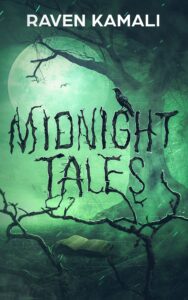With the unprecedented 9% growth of the book publishing industry, you may wonder, “Which is better, self-publishing or traditional?”
For better or worse, you won’t find a definite answer to this question (and if you do, somebody is trying to sell you something). Traditional publishing vs self-publishing is a puzzle, the solution of which depends on your preferences, strengths, and life circumstances. Throw hybrid publishing on top of this puzzle, and it becomes an even more challenging task.
In this article, we gathered the pros, cons, and specifics of self-publishing, traditional, and hybrid approaches, so you can decide which one will work better for you.
The state of self-publishing in 2022
Amazon KDP is the biggest corporate player in the self-published literature market. If you want to know how the industry’s doing, check how KDP is doing.
The most straightforward way to evaluate the state of KDP is to take a look at Kindle Direct Publishing global fund. KDP global fund is a budget from which Kindle Unlimited authors get paid.
So, here are a few fund stats that put the growth of self-publishing in perspective:
- In December 2021, KDP global fund was $40.2 million.
- In December 2020, KDP global fund was $34 million.
- In December 2017, KDP global fund was $19.9 million.
- In December 2014, at the inception of Kindle Unlimited, KDP global fund was $2.5 million.
As you see, KDP global fund grew by $6 million in the past year alone and was multiplied by 16 in the past 8 years. (If you ever wondered if self-publishing on Amazon is worth it, the answer is yes.)
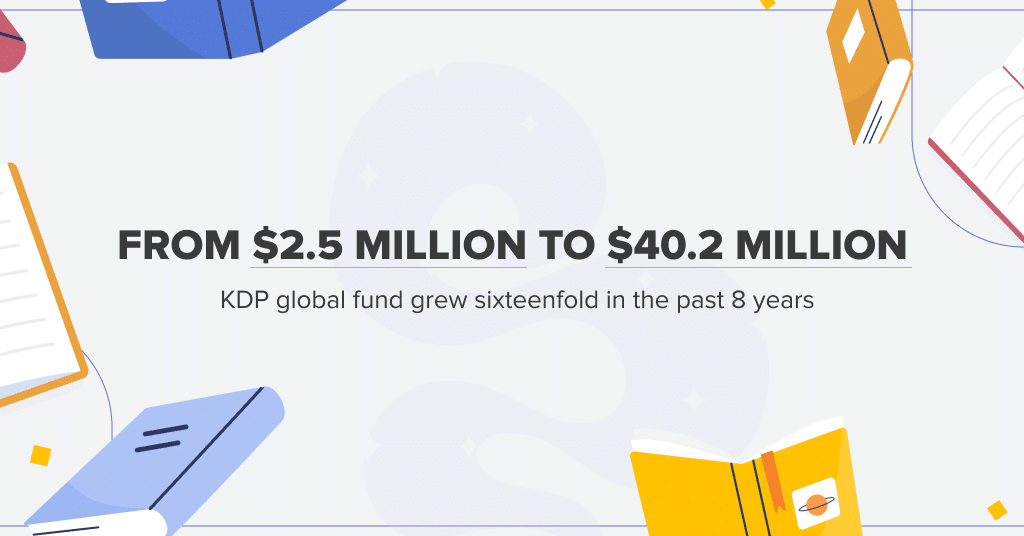
Of course, the number of indie authors grew exponentially as well. But, KDP global fund stats show that the demand for self-published books continues growing.
Though, your trip through the Internet jungle may have painted another picture of the self-publishing industry.
“The market is oversaturated; self-publishing is not a viable career choice; it’s a complete lottery,” are some of the sentiments that surround the self-publishing industry.
However, the negativity bias and the Internet’s tendency toward controversy and “hot topics” distort reality. Besides, the negative voices are always the loudest ones, while happy authors aren’t likely to vent online.
Lyra Parish — half of the NY best-selling duo Kennedy Fox — says that negative sentiments surrounding the self-publishing industry haven’t changed much since 2014 when she started self-pub. The author claims those sentiments don’t reflect reality, and her colleagues and peers have seen considerable success in the past year.
Okay, it’s all fine and dandy, but let’s address the elephant in the room:
Is self-publishing cheaper than traditional publishing?
Self-publishing isn’t cheaper than traditional publishing. If you want good chances of success in self-pub, you need to invest in book cover design, editing, proofreading, and marketing. But, it’s generally much quicker to self-pub a book than get a trad deal, so you save time.
The state of traditional publishing in 2022
With such a boom of the self-publishing industry, the question arises:
Is traditional publishing dying?
No, traditional publishing isn’t dying. And the 825.7 million print books sold by US publishers in 2021 are solid proof. That’s was an 8.9% increase compared to 2020.
Part of the reason for such a book publishing success was a pandemic — more free time and the desire to escape from anxiety led to more reading. And the numbers support it: Adult fiction sales grew by 25% compared to 2021, while adult nonfiction increased by 4.4%.
As you see, traditional publishing isn’t dying; far from it. But, the industry is likely to change, embracing a hybrid publishing approach more and ‘hunting’ for self-publishing stars.
So, if you’re goal is to get that sweet trad publishing deal, don’t get discouraged — the market is hot, and the opportunities are ripe.
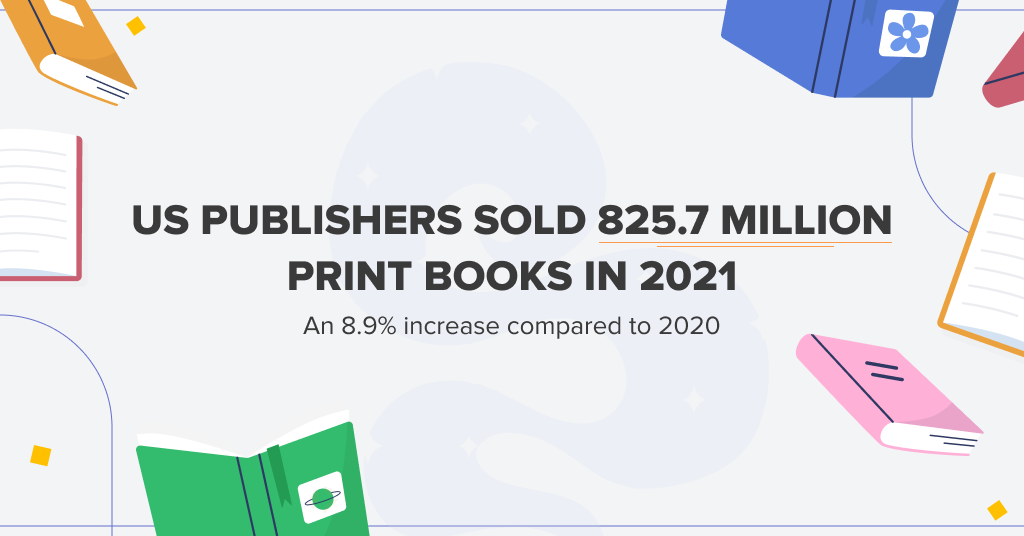
So
How hard is it to get traditionally published in 2022?
If Xiran Jay Zhao’s experience is any indication, not much has changed — getting a trad deal is hard. A best-selling NY author and an overnight YouTube star had quite a long and thorny way to getting a coveted contract with a publisher. You can check out her incredible traditional publishing adventure here

As always, to get traditionally published, you need to write a marketable book, find relevant agents who work with such stories, and exercise your patience while sending damn-good query letters again and again.
But overall, we see new authors’ names entering the publishing market each year. Your chances of getting signed are as good as ever.
Traditional publishing versus self-publishing pros and cons
As you see, both self-publishing and traditional publishing are viable in 2022. Even more, both industries are going strong, selling millions of books and finding new readers.
So, which of the approaches is better for you? To figure it out, let’s take a look at the advantages and disadvantages of traditional publishing vs self-publishing.
The pros and cons of self-publishing
Self-publishing has come a long way and matured into a strong, popular market with an active community of writers and readers.
Here are the core advantages and disadvantages of self-publishing in 2022:
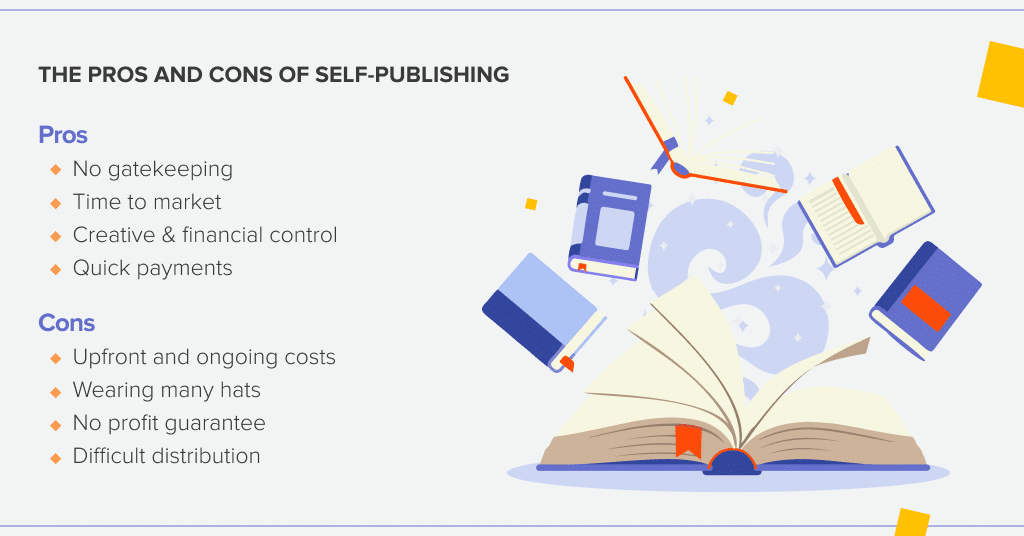
Pros of self-publishing
- No gatekeeping
No query letters to write, no agents to persuade, no rejections to read.
Arguably, the most tempting advantage of self-publishing is the absence of gatekeeping. With self-publishing, you shouldn’t prove that your book is worth readers’ attention. The only person that stands between you and your readers is you. If you think your book is good to go, you can publish it. (Tough, we see how it can be a major issue for authors with a nit-picky or overzealous inner critic.)
- Time to market
Self-publishing is as quick as it gets. For example, on Amazon KDP, “publishing takes less than 5 minutes, and your book appears on Kindle stores worldwide within 24-48 hours.”
- Financial and creative independence
With self-publishing, all the profits (despite the fees you pay to the platform that distributes your book) and rights belong to you. You can do with your book what you please.
Also, you have complete control over all the creative and management decisions, including marketing strategies, book cover design, interior design, editing, etc.
- Quick payments
Amazon KDP pays royalties each month “approximately 60 days after the end of the month in which the sale was reported.” It means that you get paid regularly based on the performance of your book.
Cons of self-publishing
- Upfront and ongoing costs
All the creative and financial independence of self-publishing comes at a cost. You invest in editing, layout, book cover design, marketing, printing books, and distribution. You can do all of it on budget, but the process requires knowledge of the industry and a lot of work.
- Juggling several competencies
A self-published writer rarely has an opportunity to be a writer only. A successful indie author is also a marketer, supervisor, community manager, and CEO of a one-person publishing company.
- No guarantee of profit
In self-publishing, you get paid based on how many copies you’ve sold. There’s a chance you won’t get back what you’ve invested.
If self-publishing benefits meet your goals, check out our guide on How to Self-Publish a Book In 2022.
The pros and cons of traditional publishing
Traditional publishing is an old and well-established industry that is somewhat slow to change.
Here are the core advantages and disadvantages of traditional publishing in 2022:
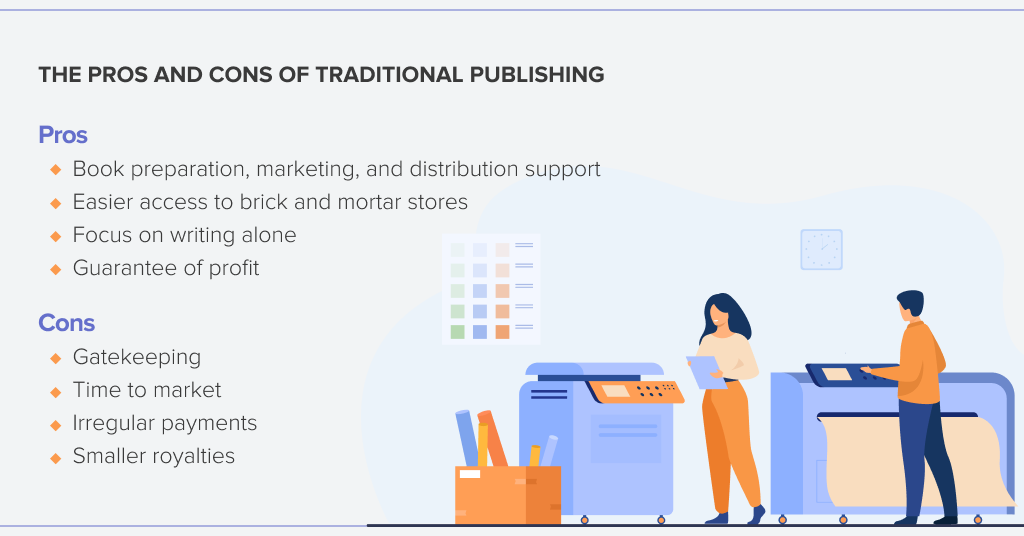
Pros of traditional publishing
- Book preparation, marketing, and distribution support
In traditional publishing, you’re not a one-person army. Publisher invests in your book, so they will help you to get it up to the standards. Editing, layout, book cover design will be handled for you. The traditional publisher will also distribute your book and maybe even help to market it. Though the latter one is usually reserved for established authors.
- Focus on writing alone
Support of the publisher means that you don’t have to handle all the other aspects of getting the book into the world. You can focus on writing alone (well, and some marketing too).
- Guarantee of profit
If you get a traditional deal, you’ll get paid a specified sum of money regardless of your book’s market performance.
- Easier access to brick and mortar stores
If you want to distribute your print books to brick-and-mortar stores, you’ll have a much easier time with traditional publishing. Getting your self-published book into physical stores is a challenge in and of itself.
Cons of traditional publishing
- Gatekeeping
There’s no short way to get traditionally published without running the gauntlet of getting accepted.
So
Plenty of query letters to write, lots of agents to persuade, more than enough rejections to read.
- Time to market
On the contrary to self-publishing, traditional publishing is a slow process. Even if you get a traditional publishing deal, your readers would see your book in 18 months on average.
- Irregular payments
You’ll get paid as specified in the contract, but the payment wouldn’t happen ASAP. Often, an author’s payment is divided into smaller chunks that are paid throughout the publication process. Some authors have to wait more than a year before receiving their money.
- Small royalties
As a self-published author, you can expect to earn up to 60% off of each book sale.
As a traditionally published author, you can expect 5-25% of royalties, depending on the book format. In some cases, you won’t get any royalties until your book sales pass a certain threshold.
What about hybrid publishing?
There’s also a third publishing approach that is rarely discussed — hybrid publishing — which is a middle ground between traditional and self-publishing.
What is a hybrid publishing deal?
A hybrid publishing deal is a publishing model that charges the author upfront costs for producing the book and takes a percentage off of sales for their book distribution services. At the same time, authors keep the rights to their books. A hybrid publisher is responsible for keeping all their services and books up to the industry’s standards, including editing, interior design, and book cover design.
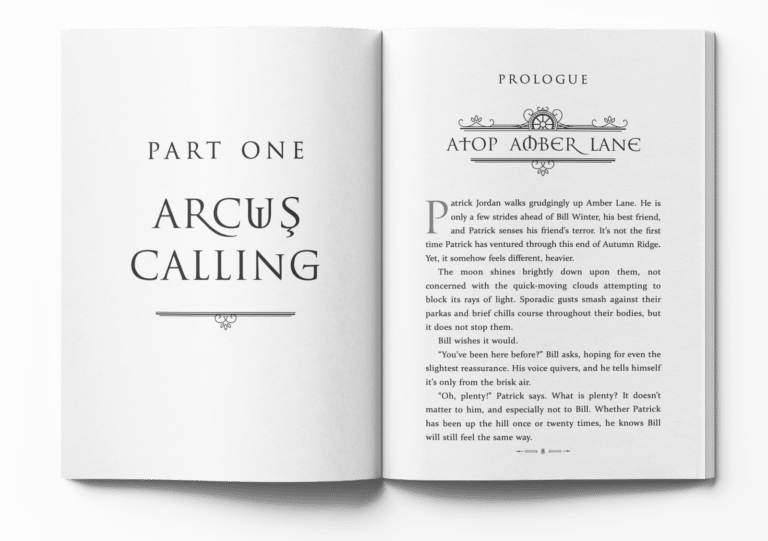
Interior design by MiblArt
The fee of hybrid publishers is usually higher than that of self-publishing platforms, such as KDP, but lower than that of traditional publishers.
In 2018, Independent Book Publisher Association (IBPA) defined 9 criteria hybrid publishers should meet.
According to the criteria, a hybrid publisher should
- Define a mission and vision for its publishing program.
- Vet submissions
- Publish under its own imprint(s) and ISBNs.
- Publish to industry standards
- Ensure editorial, design, and production quality.
- Pursue and manage a range of publishing rights.
- Provide distribution services.
- Demonstrate respectable sales.
- Pay authors a higher-than-standard royalty.
Is hybrid publishing the same as vanity publishing?
Hybrid and vanity publishers are two different publishing styles. Though hybrid and vanity press are really similar on the surface level, which can be confusing.
The main difference between hybrid and vanity publishers is that vanity publishers don’t earn money from your book sales and don’t care about which books they accept. Vanity publishers earn from authors’ desire to release a book no matter its quality (hence, the name vanity).
At the same time, hybrid publishers are genuinely interested in seeing their books succeed because they also get a share of royalties.
Besides, if a hybrid publisher fails to uphold the industry’s standards, they won’t qualify as a hybrid publisher by the IBPA criteria. As a result, the publisher’s reputation will suffer, and authors will be less likely to work with them.
Hybrid publisher vs vanity publisher warning!
Still, such a similarity of vanity and hybrid publishers means that you have to be cautious. Better to double-check hybrid publishers before working with them. One of the ways to do it is to check watchdog lists, such as this list by the Alliance of Independent Authors.
The benefits of hybrid publishing
As you see, hybrid publishing is a somewhat strange beast. But, it’s easy to see why there’s demand for this approach.
Hybrid publishing advantages
- Easier to get a book publishing deal because the publisher doesn’t risk as much
- Support of a quality book producing infrastructure: editors, designers, marketers
- Book rights stay with the author
- Higher royalties than in traditional publishing
Traditional publishing vs self-publishing vs hybrid publishing: which to choose?
So, traditional publishing vs self-publishing vs hybrid publishing: which is better for you?
Is it worth it to traditionally publish?
Traditional publishing is good for authors who
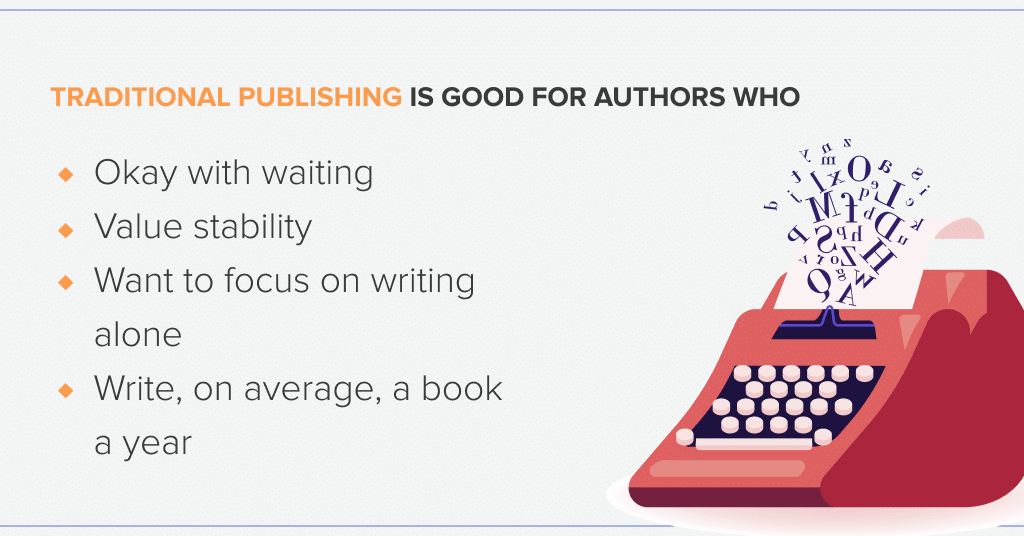
- Okay with waiting
If you want to publish traditionally, you should accept the idea that the readers won’t see your book for a while. Signing with a publisher and waiting for a book production to complete may take a few years in the worst case.
- Value stability
If you get a traditional publishing deal, you’ll be paid 100%. The sum you’ll receive may not be big, but it is privilege self-publishing can’t give you. If such stability is important for you, traditional publishing is the way to go.
- Want to focus on writing alone
If you want to do writing and not much except writing, traditional publishing is more likely to satisfy your demands (at least, to a bigger extent).
- Write, on average, a book a year
Traditional publishing is ideal for a single book a year because producing each book is a long process.
If you want to publish more than a book a year, you’re better off with self-publishing.
Is it worth it to self-publish a book?
Self-publishing is good for authors who
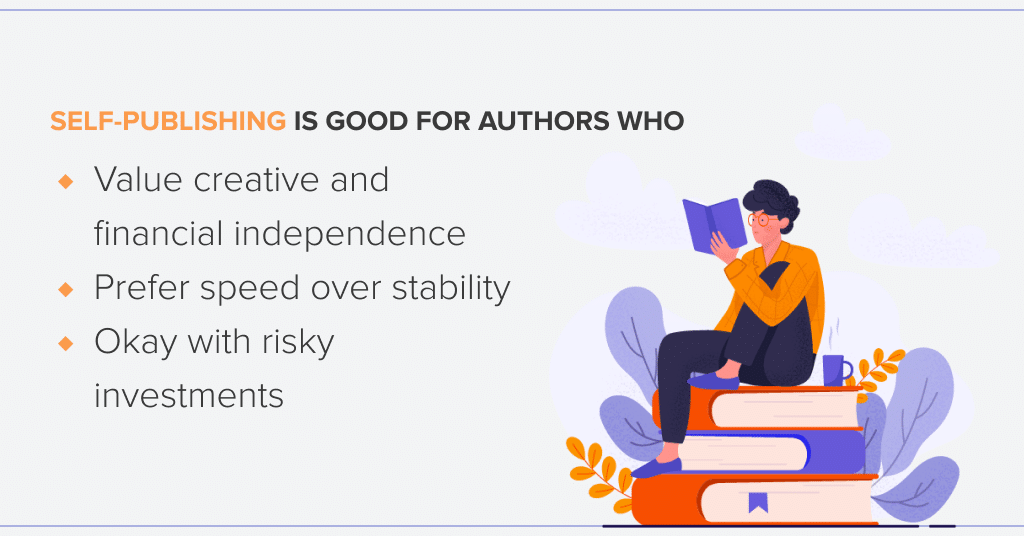
- Value creative and financial independence
If you want to be your own master and have complete control over book production, distribution, and marketing, then choose self-publishing.
- Prefer productivity over stability
If getting paid for each book you release isn’t as important for you as maximizing your chances of success by releasing more books, self-publishing is the answer.
- Okay with risky investments
Each self-published book is an investment of time and money that isn’t guaranteed to pay off. You must tolerate high risks and potentially low rewards well to be comfortable with self-publishing.
Is it worth it to hybrid publish?
Hybrid publishing is good for authors who
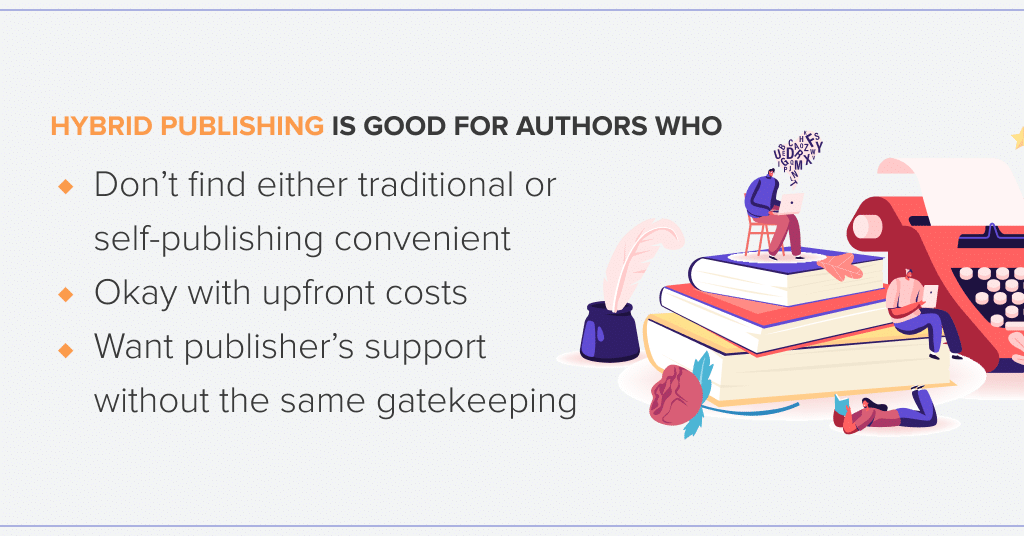
- Don’t find either traditional or self-publishing convenient
If traditional publishing seems like too much of a commitment to someone’s control and self-publishing is too much of risk and work, a hybrid approach can be your solution.
- Okay with upfront costs
With a good hybrid publisher, your risks are much lower than with an indie approach as you’ll have access to high-quality book production services. Still, you must be ready to cover book productions expenses that may cost you up to a few thousand dollars.
- Want traditional publisher’s support without the same gatekeeping
If you really wish to be a traditionally published author, but the idea of applying and getting dozens of rejections fills you with deep dread, a hybrid approach may help you. It’s much easier to get a deal with hybrid publishers as they don’t assume the same level of risks. As a result, they are more open to different books, including literature that may not be super trendy right now.
Summing Up
As you see, the challenge between self-publishing vs traditional publishing vs hybrid publishing doesn’t have a clear winner. The viability of each approach depends on the author and their preferences. Besides, the book industry is going strong, so you shouldn’t worry about choosing the “dying” niche. Just be sure to do your research and be honest about what you really want from your author career.
Good luck and have fun!
Also, if you need a high-quality book cover or marketing materials for your self-published story, feel free to contact us. We’re happy to answer any questions.
_________________________________________________________________________________
Self-publishing vs traditional publishing FAQ
What is the difference between traditional publishing and self-publishing?
The difference between traditional publishing and self-publishing is in who covers the costs of book production and maintains the book rights and the majority of profits.
With self-publishing, you cover all the costs of book production but maintain all the rights, creative freedom, and the majority of profits. With traditional publishing, you sell the rights for your book to the publisher who covers the production expenses but gets the bigger cut of the profits.
Do you make more money self-publishing or traditionally publishing?
On average, you make more money per book sale in self-publishing. For example, an indie author can expect to earn up to 60% royalties on Amazon KDP. Usual traditional publishing royalties are 5% for mass-market paperback sales, 25% for eBook sales, and 15% for hardback sales. Though royalties differ depending on how many book copies were sold.
Though, if you’re a bestselling author, you can get a really good deal from a traditional publisher that will compensate you incredibly well.
Why it’s better to self-publish?
It’s better to self-publish than traditionally publish because an author maintains all the rights to the book, has complete creative freedom over book editing, marketing, layout, and book cover design, and earns more off of book sales.
Why you shouldn’t self-publish?
You shouldn’t self-publish if you don’t have the resources to invest in book cover design, editing, and book layout. Without such preparation, your book wouldn’t be competitive, and your author brand will suffer as a result. You want your first published book to be high-quality so readers don’t dismiss you.
Can self-publishing lead to traditional publishing?
Self-publishing can lead to traditional publishing. If you’re a successful self-published author, a traditional publisher may offer you a contract for your future book releases. Though, if your book is already on the market, the chances that a publisher will re-release it under their name are low.




